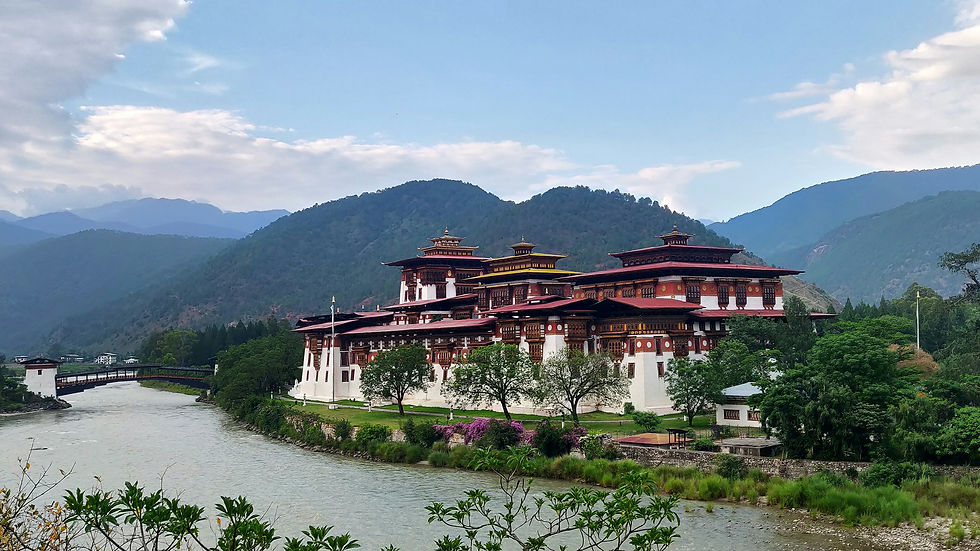The 3 Men and Long History of Ethnic Cleansing: Will the Bhutan Government change?
- Durham Asian Law Journal

- Aug 15, 2025
- 6 min read
Written by: Yanis Miu
Edited by: Mike Yang

Introduction
Bhutan, a country known for prioritising the well-being of its people, sustainable tourism, and a country filled with life. However, their dark past has come back to light with the recent publishing of an article by the South China Morning Post detailing the detention of 3 political opponents - Birkha Bahadur Chhetri, Kumar Gautam, and Sunman Gurung. These 3 men were not the only victims, as for the past 30 years, Bhutan has inhumanely stripped away the rights of Ethnic Nepalese people (Lhotshampa) living in the country. This article discusses the 3 men’s detention, the history of ethnic cleansing within Bhutan, the Government’s response, and their plan of continuing to exploit people as they build a new tourist “paradise”.
Detention of 3 Political Opponents
The three men, Birkha Bahadur Chhetri, Kumar Gautam, and Sunman Gurung were arrested in 2008 for distributing political pamphlets, convicted of treason under Bhutan’s National Security Act, and sentenced to life without parole [1]. They were charged under Article 6 of the Act and s.329 of the Penal Code. The National Security Act states that whoever engages in treasonable acts against the TSA-WA-SUM (King, People, and Country) or attempts to do so, either within or outside Bhutan shall be punished with death or be subject to imprisonment for life [2].
The National Security Act was created expressly to deter Bhutanese citizens—especially those who speak Nepali—from opposing the government. Originally, they were arrested because they had no documents to prove that they were citizens of Bhutan [3]. The government also abused their power by revoking the citizenship documents, rendering it impossible for them to legally enter Bhutan. This violates their rights to movement, which is a fundamental right.
Under custody, they were not allowed to contact family members and were questioned relentlessly without a right to have a lawyer present. They also had no lawyer to defend themselves in the trial. They were placed in block 5 of Chemgang Central Prison in Thimphu, where they remain to date, with no possibility of parole [4].
The three men’s arrest also attracted international attention from Human Rights Watch and Amnesty International as it breached the prisoners’ right to a fair trial. Articles 18 to 20 of the Universal Declaration of Human Rights guarantee the rights to freedom of thought, freedom of opinion, and freedom of expression, which have all been violated [5].
Lengthy Record of Ethnic Cleansing
Brief History
The Ethnic people, known as Lhotshampas, migrated to Bhutan in the 19th century and settled in the then largely uninhabited southern part of the country. They are predominantly Hindu, unlike Bhutan – whose religion is mainly Buddhism [6]. By the 1970s, the Ngalop government saw the population as a threat and introduced discriminatory laws, rendering the people to lose their citizenship and tried to force the Ngalop culture and language onto the people, stripping them away of their identity [7].
The 1985 Bhutan Citizenship Act permitted citizenship to be revoked for reasons such as perceived disloyalty to the King or country, using arbitrary and discriminatory means that breached international human rights law. In 1988, the government began executing this act through a census, resulting in the widespread loss of citizenship for many Lhotshampas. Protests occurred in 1990, and police arrested many who participated. Several citizens escaped during this time. Bhutanese authorities arrested and prosecuted numerous persons for allegedly participating in protests and other stated national security offences, primarily during the 1990s and lasting until 2008 [8].
Unfair trials and arrest
The ethnic people have suffered inhumane abuse from authorities after being in police custody, such as starvation, coercion, etc. Some of them have also not been allowed to attend criminal proceedings. Additionally, detainees were generally not aware of their right to a lawyer because they had not been informed of this right by the police [9].
Prisoners have described the trial in grave detail: “They [Bhutanese soldiers] arrested us and took us to their barracks, and for 20 days they treated us mercilessly. They tied us and used cane sticks to beat us continuously on our entire body particularly on the bottom of our feet. They beat us so much on our feet that they became senseless after a while. They also immersed us in ice-cold water…, and tied our hands and legs for nearly seven days providing some fried corn to consume” [10].
Prisoners have also stated that the coerced evidence was used in trial and that judges would not hear from them and would use their own statements to effectively land them in prison – creating an unfair trial and ruling with an iron fist in the judiciary.
For example, Taw Tshering, Tshampa Wangchuck, Tshampa Ngawang Tenzin, and Chhipon Samten Lhendup, four DNC (a political party set up in exile) members, have been serving sentences at Tashi Yangtshi prison since being convicted on sedition charges. They were prosecuted and found guilty without the opportunity to engage a lawyer. Furthermore, they were often denied the chance to be present during the criminal trials [11].
The prisoners have been dehumanised and have lacked the basic rights of being in a fair trial and to have a fair hearing. Their fundamental rights that are supposedly protected under the law are being stripped away due to the government’s abuse of power. The government’s treatment has violated Articles 9 and 10 of the Universal Declaration of Human Rights, which restricts arbitrary torture and guarantees a fair hearing by an impartial tribunal.
Limited Social and Economic Rights
Other than being abused and stripped away of rights within courts, Ethnic Nepali people have also faced discrimination by the government and have suffered difficulties in business and daily life because of the restrictions.
According to the Country Reports on Human Rights Practices in 2022, Ethnic Nepali residents frequently struggled to obtain a police security clearance certificate, which without, they had difficulty starting a business, enrolling in higher education, or obtaining passports or government jobs, and the process of registering property could be time-consuming for them. Ethnic Nepalis sometimes faced difficulty gaining employment [12].
This puts the Nepali citizens in a vulnerable position. Ethnic Nepali people are underrepresented in the employment force and struggle with gaining further education and maintaining their status as a citizen within the country. The treatment by the Bhutan government violates Article 7 of the Universal Declaration of Human Rights, which does not permit discrimination on any grounds.
Government’s Response and the Gelaphu Mindfulness City
Despite the International scrutiny, the government has denied their existence and focused on creating a paradise-like image within Bhutan [13]. The UN group has said that the Bhutanese government had not replied to their concerns. Bhutan’s Ministry of Home Affairs also did not respond to This Week’s in Asia’s email seeking comments [14].
The government is instead focused on creating a paradise-like city, known as the Gelaphu Mindfulness City. It is a city that is filled with nature, agriculture and culture, a project aimed to bridge South Asia with Southeast Asia promoting tourism and breaking the “Shangri-La” image of the landlocked, carbon-negative country [15].
However, the city is built on land that was owned by the Lhoshampas. The people used to farm and live on the land that the city is being built on. The community that has been discriminated against for decades is now witnessing their home being used as land by the government to promote tourism. They have lost a part of their culture that they can never gain back. To the government and the country, this may be a sign of progress, promoting tourism and job opportunities. For the ethnic people, they fear their status within the country. The government does not seem to be stopping the discrimination and abuse of the people despite the scrutiny.
Conclusion
Throughout the decades and to now, the Bhutan Government has abused its power and discriminated against the ethnic people and stripped away their fundamental rights. Despite its ambitious tourism initiatives, the government shows little intention of addressing its entrenched discrimination and human rights abuses urgently.
REFERENCES
[1],[14] Bibek Bhandari, ‘Bhutan’s life sentences for political prisoners violate international law, UN says’ (South China Morning Post, 21 Mar 2025) < https://www.scmp.com/week-asia/lifestyle-culture/article/3303257/bhutans-life-sentences-political-prisoners-violate-international-law-un-says> accessed 25 Mar 2025
[2] National Security Act of Bhutan 1992
[3],[4],[5],[9] Human Rights Council, ‘Opinion No. 60/2024 concerning Birkha Bahadur Chhetri, Kumar
Gautam and Sunman Gurung (Bhutan)’ (AHRC, 18 February 2025) < https://www.ohchr.org/sites/default/files/documents/issues/detention-wg/opinions/session101/a-hrc-wgad-60-2024-bhutan-advance-edited-ve.pdf> accessed 25 Mar 2025
[6],[7],[8],[10],[11] Human Rights Watch, ‘Bhutan: Free Long-Term Political Prisoners’ (Human Rights Watch, 13 March 2023) <https://www.hrw.org/news/2023/03/13/bhutan-free-long-term-political-prisoners> accessed 27 Mar 2025
[12] United States Bureau of Democracy, Human Rights and Labor, ‘BHUTAN 2022 HUMAN RIGHTS REPORT’ (US Department of State, 2022) < https://www.state.gov/wp-content/uploads/2023/02/415610_BHUTAN-2022-HUMAN-RIGHTS-REPORT.pdf> accessed 25 March 2025
[13] Nepali Times, ‘Detainees in dire straits in Bhutan’s prisons’ (Nepali Times, 2025) < https://nepalitimes.com/news/detainees-in-dire-straits-in-bhutan-s-prisons> accessed 25 March 2025
[15] Diwash Gahatraj, ‘What Will Bhutan’s Mindfulness City Mean for the Lhotshampa Community Displaced From the Region?’ (Inkstick Media, 2024) <https://inkstickmedia.com/what-will-bhutans-mindfulness-city-mean-for-the-lhotshampa-community-displaced-from-the-region/> accessed 25 March 2025







Comments